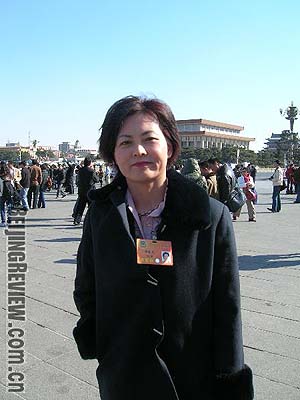|

Xu Xiaolan, a new member of the CPPCC National Committee and member of the China Zhi Gong Party, is confident her proposals will be solved by the government
|
Confident in her mission
Sun Fengyuan, a new member of the CPPCC National Committee, is an eye surgeon with more than 20 years of experience and vice-director of an ophthalmologic hospital in Tianjin.
He brought to the annual session of the CPPCC two proposals, both closely related to his work experience. He said hospitals in China, including his own hospital, have been caught in a craze of overvaluing an MD degree and undervaluing the practical kills of the candidates in recruiting medical college graduates.
Sun said a relatively large pool of medical college graduates in recent years have provided big hospitals more room in selecting doctors. Yet the excessive emphasis on academic studies in the labor market has caused the dilemma that many medicine doctorate holders fresh out of college have missed the best timing to be trained as a surgeon. "It is usually easier to train a young doctor in his or her early 20s as a good surgeon than a doctorate holder in his or her 30s with no experience in practicing medicine," Sun said.
Yet the apparent oversupply of medical college graduates does nothing to ease China's chronic social problem of difficult access to over-priced medical care for the general public. Sun explained medical resources have been distributed unevenly in China. While good staff and equipment concentrate mainly in renowned public hospitals in cities, community clinics and smaller hospitals in cities and rural areas suffer from acute shortages of medical equipment, government financing and competent doctors and surgeons. Some of Sun's students, with a master degree in medicine, would rather work for drug companies than work as doctors in small hospitals after they were refused by big hospitals.
"People can only trust doctors in big hospitals, which makes access to medication difficult while community clinics and smaller hospitals have to prescribe expensive medicines for patients to make money to survive, which partly explains people's complaints about expensive medical care," Sun said.
Sun wrote down suggestions to the government in his proposals: increasing the practical skill training of medical college students and enlarging government investment in community clinics.
Also a new member of the CPPCC National Committee, Xu Xiaolan is a member of China Zhi Gong Party and vice-director of the China Center for Information Industry Development. Two of her seven proposals expose problems from her daily work that she has been thinking about for a long time. One proposal is to boost information sharing between government websites. The concrete measures include building a unified government information platform in the long run and training chief information officers out of civil servants in the short run. The other proposal, full of the latest statistics and graphs, demands government subsidies for farmers to purchase personal computers and broadband Internet equipment, and to provide computer training.
"I am confident that the issues in my proposals will be solved. On the one hand, the state has given more attention to CPPCC member proposals. On the other hand, good quality proposals, with thorough analysis on reasons behind the problem and sound measures for solving the problem, will be put into practice even faster," Xu said.
(Beijing Review March 7, 2008)